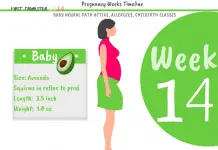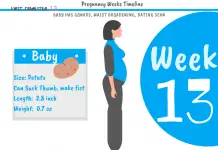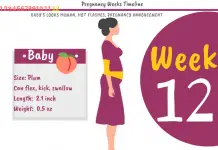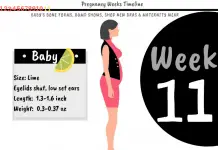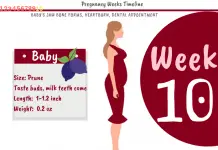The first trimester of pregnancy is from week 1 – week 13 of pregnancy. Physically you may not seem pregnant to others during this period but it is the most important part of gestation. There is so much to know about the first trimester even before you actually conceive. That is because it includes the first three weeks from your previous menstruation. From the maturation of the egg, ovulation to conceiving, you already reach the 3rd month of pregnancy.
Surprised? Keep reading to learn more such first-trimester pregnancy facts.
The first trimester of pregnancy means the 1/3rd of 9 months of pregnancy. You can divide pregnancy as weeks, months or trimesters. It’s important you know the definition of each because your OB will use these terms for appointments and tests.
![First Trimester [Week 1- Week 13 Overview]](https://www.pregnanteve.com/wp-content/uploads/2019/07/first-trimester-of-pregnancy.jpg)
How many weeks is the first trimester of pregnancy?
The first trimester lasts from week 1 to week 13.
How long is the first trimester of pregnancy? Albeit just 3 months, the last part of the first trimester feels like an eternity. You won’t realize the first few weeks because conception will occur in week 3. Later when the pregnancy toxicosis and nausea begin time will adopt snail’s speed.
Risk of miscarriage is highest in the first 6 weeks of pregnancy. Preimplantation failures are the biggest cause of miscarriage. All major organ systems of baby form in the period between 5-11 weeks. Later they continue to grow in size and gain function.
Week 1
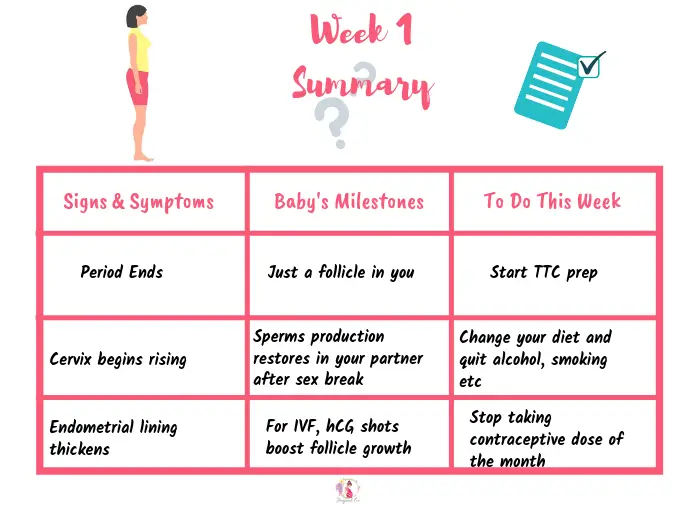
The first week of pregnancy is never known while it’s going on. There is a probability of 35% every month near ovulation day to conceive. No one can guarantee that beforehand that this week you will conceive. Even after fertility treatment, there is still a probability of failing to get pregnant.
Your baby is divided into two parts inside you and your male partner. For this week you both are actually carrying the baby!
Main Symptom: Menstrual Period Ends
The only sign you see this week is the desire to conceive or not even that if you get pregnant by chance. TTC women after their period ends start tracking ovulation date. Your period must be regular before you’re trying for a baby. With irregular periods this week will be under deception.
To Do This Week
- Start tracking ovulation based on your cycle length, take an ovulation test
- Get ready to get busy in baby making in the coming weeks
- Keep stress at bay and eat healthy food
- Quit smoking, alcohol, and reduce caffeine
Baby This Week: Follicle
Your baby is a tiny follicle waiting to develop under the influence of ovarian hormones. You’re right now in the proliferative stage of the menstrual cycle. Endometrial lining begins to thicken and the tiny follicles start maturing.
Week 2
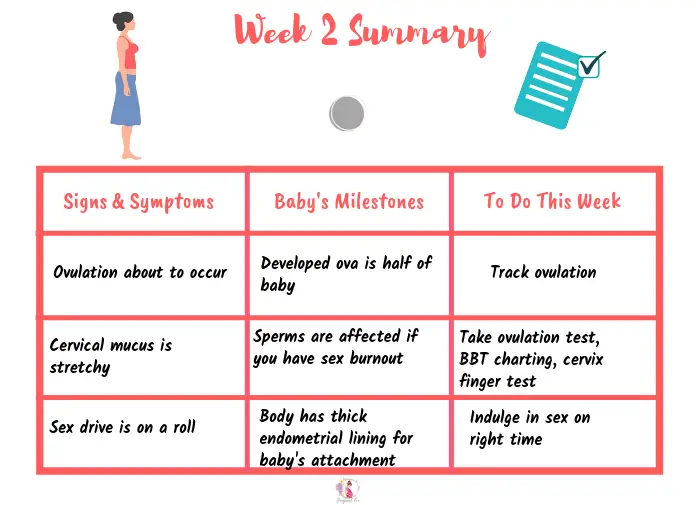
Ovulation week is the climax of getting pregnant. Within a period of 24 hours of ovulation, if sperm and egg meet, you will be pregnant. This week give undivided attention to your body’s cues about future ovulation.
Main Symptom: Egg White Cervical Mucus
Changes in cervical mucus and position are signs of ovulation. The white stringy mucus from cervix shows that ovulation is just about to happen. Sex is pleasurable and more effective with lubrication from the cervix. Other signs include prominent breast nipples, shiny hair, frequent urination, glow and rise in basal body temperature. The first sign of pregnancy after sex is felt by some women as a feeling of narrowing of the cervix.
To Do This Week
- Take ovulation test, BBT, cervical mucus finger test to determine the ovulation day
- Have sex a day before and on the day of possible ovulation
- Don’t indulge in strenuous exercises
- Go out to a peaceful place for conception
- For IUI, this week is the appointment for the procedure
- IVF therapy egg retrieval will be after ovulation
Baby This Week: Ova and Sperm
The baby is still an egg and sperm 50-50. The follicle has matured and will rupture to release the egg. Size of follicle increases under the action of FSH and estrogen. The hormone LH peaks to take the egg out off the cyst.
Week 3
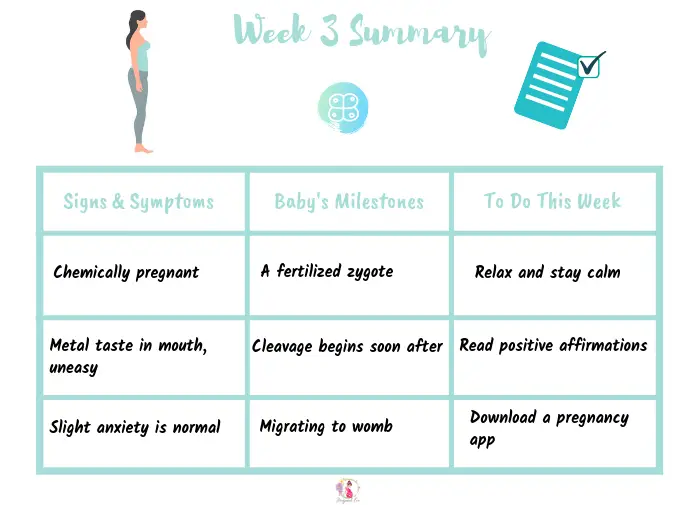
Congratulations! If you’re here means you did conceive. You are actually through the most anxious period – Two Week Wait. Women find it very hard to cross this period between ovulation and a positive pregnancy test. Stress is the enemy of pregnancy. Staying calm is necessary for conception. Now the real development of the baby will start and you will soon see the two pink lines.
Main Symptom: Pregnancy Toxicosis
As the menstrual cycle takes a turn from the usual track of going into PMS the body releases chemicals into the bloodstream such as the Early Pregnancy Factor. The new development is foreign to the body. Toxicosis during this week will seem like aggravated PMS. You may start getting weird twitching pains and feel lethargic. Super early pregnancy tests are now using these chemicals to detect pregnancy within days after sex.
To Do This Week
- Take ample rest, you must stay off your feet and maintain a calm demeanor
- Keep some lemonade handy to stay hydrated
- Consult your doctor about your previous prescriptions
Baby This Week – Fertilisation
Your baby’s first cell zygote has already formed. Within the first 36 hours, the division of the cell will take place without separation. The fertilization site is the fallopian tube. Gradually your baby is descending into the uterus. Once the embryo reaches the site where it will attach, implantation will occur next.
Week 4
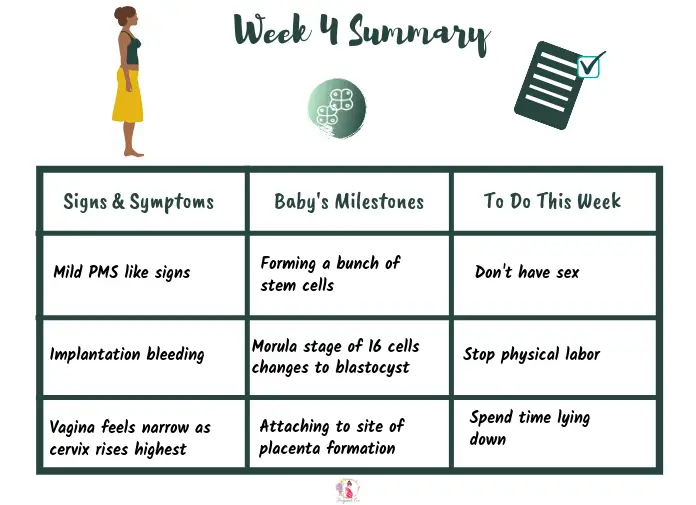
Implantation has long confused every mum to be. You’re chemically pregnant but yet to know it for sure. The attachment of the embryo to the wall of the uterus is a two-stage process called implantation. Releasing factors on the endometrial lining the embryo dissolves it and sinks in. The placenta will develop from this point.
Main Symptom: Implantation Bleeding and Cramps
The most common sign of implantation is brown spotting. Other signs include a triphasic pattern of BBT after ovulation. Back pain and mild cramps also sign implantation. Only 1/3rd pregnant women have implantation bleeding. Embryo implantation occurs 7-12 days after ovulation.
To Do This Week
- Preimplantation failures can cause ectopic pregnancy, avoid physical strain
- Having sex isn’t safe this week
- Things you can do during implantation include sedentary activities
- Avoid douching, tampons, vaginal cremes
Baby This Week: Blastocyst
Your baby is a 64 celled lump. There are no organs nor germ layers. The rate of division is extremely fast after crossing the morula stage. Cells are actively duplicating genetic material. These are stem cells that can form any organ and any cell. Banking them acts as a reserve for your baby in the future to regenerate any damaged tissue upon injury or mishaps.
Soon after implantation, the term layers will start forming and placenta will secrete hCG. Pregnancy test hormone hCG doubles every 48 hours. Once your blood has 25 mIU/mL you are considered pregnant.
Week 5
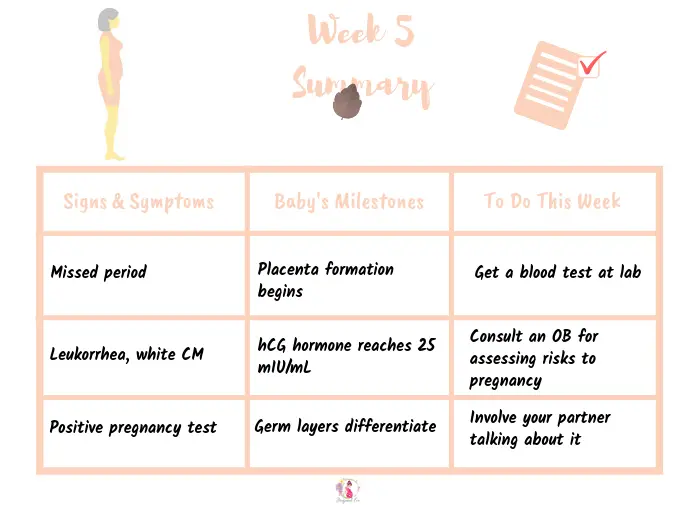
The wait is over and you will take a pregnancy test this week. More than often women don’t get a positive test soon. Best time to take a pregnancy test is after a week from the missed period. Human Chorionic Gonadotrophin (hCG) starts coming along your urine. Taking a test early morning will increase the chances of getting a positive result. Low levels of progesterone can lead to period even in pregnancy. Make sure you’re taking enough Magnesium.
Main Symptoms: Missed Period, Positive Pregnancy Test
The first week of known pregnancy goes by dreading period. Leukorrhea, white discharge keeps bluffing period flow giving you eerie period feels. A missed period is the most popular sign of pregnancy known by every woman. Other symptoms that you can expect this week include leukorrhea, headache, ovary pain and a heightened sense of smell.
To Do This Week
- After home pregnancy test shows positive, go for a beta hCG pregnancy test
- If it is an unwanted pregnancy consider medically terminating
- The prenatal pedigree analysis will help you learn more about your baby’s genes
- Get a blood test for confirming blood group and Rh factor
- Ask your doctor before having sex, doing prenatal exercises
Baby This Week: Embryo
Your baby is now an embryo with the organ systems budding. Looking more like a fish your baby will have a tail, gills and is equal to the size of the pepper. Ectoderm, endoderm, and mesoderm are the three germ layers that will form all organ. Neuronal development will occur from the outermost germ layer – Ectoderm. The mesoderm will make the alimentary canal and so on.
Weeks 6
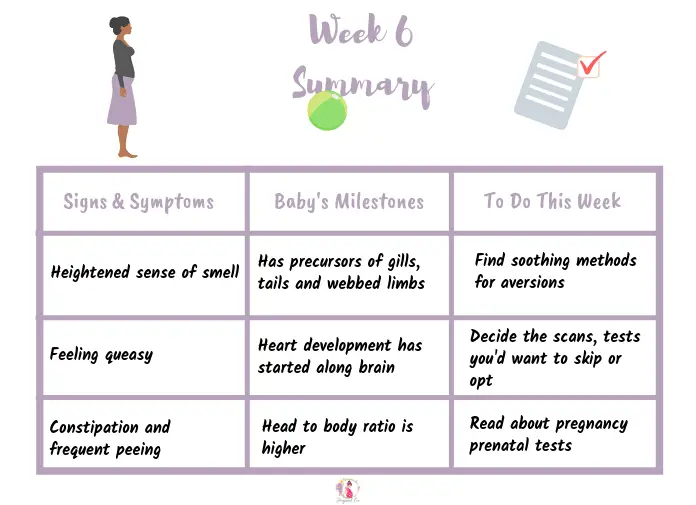
A big fat positive line will greet you in your 6-week pregnant life. The miscarriage risk is extremely high in this week. Taking care of your mental and emotional health is equally vital for protecting your pregnancy. Your first appointment with your gynecologist is near. More than you the baby is undergoing massive growth. Nervous system and heart development have started.
Main Symptom: Frequent Urination, Discomfort, and Anxiety
As your baby grows your uterus will start rising up. Gradually by week 11, it will be above your bladder at a distance. Currently, the increase in progesterone is taking a toll at your bladder making you run to pee every hour. The hormone sends more blood circulating to the lower body. But don’t try to cut water to avoid running back and forth from the loo.
Sense of smell will make you develop aversions to your previously favorites. Don’t expect a bump in this week no matter how many pictures of pregnant bellies you’ve seen. An ultrasound scan will show a gestational sac and a faint heartbeat.
To Do This Week
- Keep a list of questions ready to ask your OB during the first visit
- Read a bit about morning sickness remedies
- Start a prenatal routine and sleep for 6 hours at least, you’re going to miss it soon
Baby This Week
Gills are present in the place where ears will appear. All limbs are fused and budding. The intestines have started to develop. They will soon go into umbilical cord for growth and then descend back. Heart formation is the main development milestone of the week.
Your baby will have a heart that beats twice the times your beats a minute. The chambers of the heart will fuse. The genitalia has not grown and sex determination from ultrasound is not correct this week.
Week 7
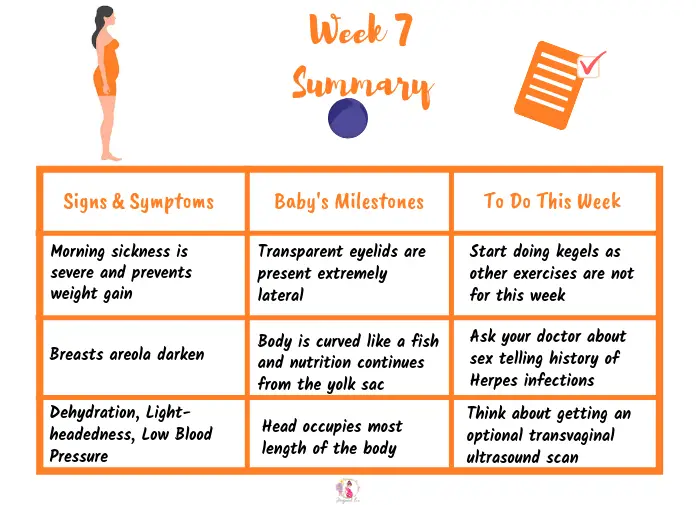
A 7 weeks pregnant woman has a baby with a heartbeat and length of, Morning sickness and puking will not let you gain weight quickly. The baby bump is yet to show but your breasts are sensitive and sore.
Main Symptom: Say Hi To Morning Sickness, Vaginal Wetness, Mucus Plug Seal
By the 7 weeks in the pregnancy, there is no way that you can escape morning sickness. Some form of nausea and vomiting is a good sign. The hormones, factors, and secretions needed for baby’s development are present if you’re having morning sickness. Till now you must have relaxed about rechecking if you’re chumming. Vagina feels wet because of the mucus plug seal. Emotionally you can expect a lot of mood swings due to aggravated morning sickness. Light-headedness due to loss of water can even faint you. Make sure you stay hydrated.
To Do This Week
- Maintain vaginal hygiene and do not poke inside to check the mucus plug
- Can get an optional transvaginal ultrasound to see your baby
- Get a handheld Doppler to hear your baby’s heartbeat
Baby This Week
Blueberry sized baby has a tail but the fish form is transforming. Little buddy weighs insignificant but is already 1/2 inch long. The umbilical cord is complete and the right vein has also gone. The placenta is increasing in mass and mucus covers the baby-protecting her. Red blood cells are being made in the liver in week 7. Eyelids are transparent and towards lateral sides.
Week 8
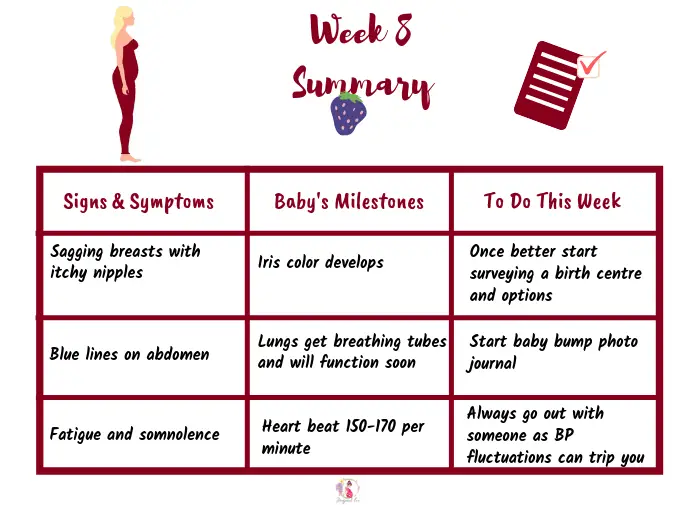
You have crossed two months of pregnancy. Surely it seems like a longer period thanks to the sickness signs. Nearing the second trimester your ugly symptoms will fade away. Itching and skin changes bother every woman. Don’t have to worry as all of them are temporary.
Main Symptoms: Tingly Breasts, Nasal Congestion, Aversions
Constipation and bloating might fake a baby bump to you. Yet early to see a bump your belly can feel hard but it’s just flatulence. Heavier boobs can make you uncomfortable. Switch to a sports bra and avoid underwire. Even with the fatigue, you can have sleepless nights. Emotional changes and anxiety crop in and can affect your social life.
To Do This Week
- Buy new bras
- Consider taking stool softeners
- Ask your doctor about using pain killers for your headaches
- Start a birth plan draft mentioning your current likings and preferences for labor
Baby This Week
Inside the shut eyelids the color of the iris is changing. Breathing tubes will extend into the lungs. Gonads bud but sex is still not detected during the scan. Size of the cherry baby is 2/3 inch. Amniotic fluid increases in volume and placenta gain more blood vessels. The skin of the baby is papery and transparent. Kidneys, intestines, thyroid gland and brain are actively working on gaining function.
Week 9
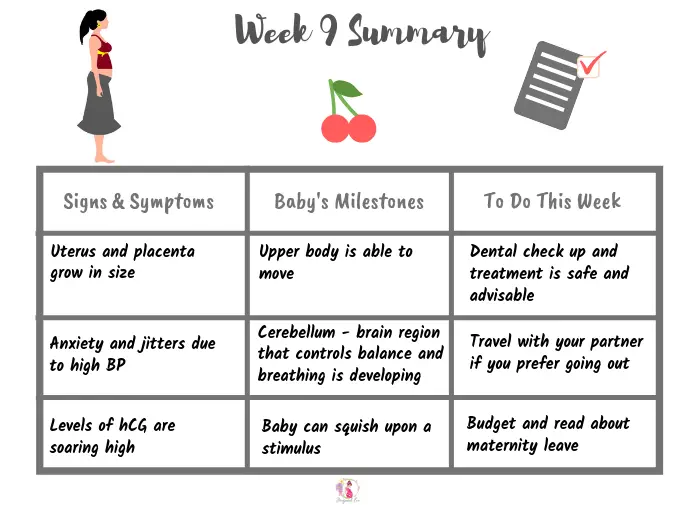
The last month of the first trimester of pregnancy is just here. Several changes in the body will make you feel pregnant. The uterus will grow up from the size of chickpea to that of a fist. Morning sickness must have made you pale by now. Check your hemoglobin levels to know if you have the risk of anemia.
Main Symptoms: White Discharge, Drooling, and Dizziness
Cervical mucus or thick white discharge will increase once again. Seeing brown discharge after sex can be because of spotting along with the discharge. Salivary glands increase the amount of saliva produced especially when you’re asleep. Get ready to wake up next to a wet pillow before a wet bed sheet from the baby! Increase in blood pressure can give you jitters or sudden drop can cause dizziness.
Pregnancy discharge during the first trimester keeps changing and is a sign of your vaginal health. Don’t wear high absorbent tampons because the discharge is a necessity.
To Do This Week
- Think about making a pregnancy announcement
- Give a thought about continuing your work, maternity leave
- Now you can travel
- A dental checkup is a good idea before the second trimester
- Twins or heartbeat detection scan can also be done
Baby This Week
Movement controlling center of the brain is interconnecting neurons. The cerebellum helps in maintaining posture and balance. Size of the baby at 9 weeks is the same as a cherry. Weight of fetus is 0.07 oz and tail of baby is completely gone and the torso starts straightening very slowly. Muscles and cartilage are becoming stronger. Upper body movements have already begun but can’t be felt.
Week 10
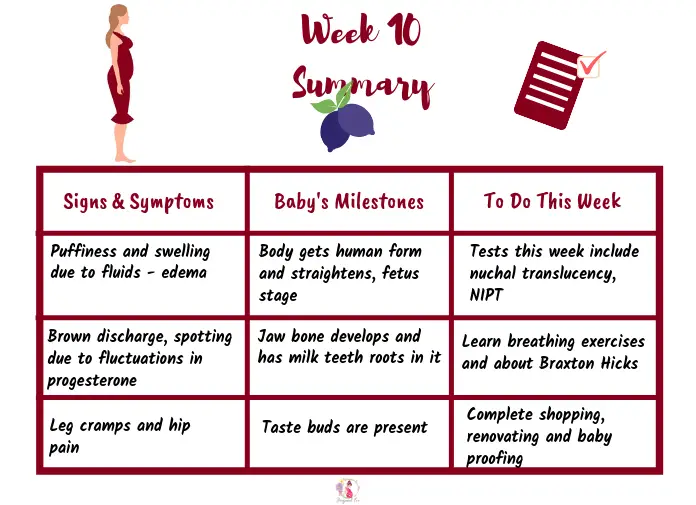
Once you’re here the risk of miscarriage has gone down and feeling of pregnancy is rock solid. You will have some relief from morning sickness. Nightmares and sleep disturbances will reduce and allow you to relax.
Main Symptoms: Spotting, Brown Discharge or Breakthrough Bloating
Week 10 is the safest chance to get your dental treatment or hair dye. Bleeding gums during the week are because of the digestion inefficiency. Just like skin gums too become sensitive and bleed. Brown discharge and breakthrough bleeding are because of fluctuation in progesterone. The level of hCG is highest in the week and suppresses other hormones.
To Do This Week
- Nuchal translucency scan detects the risk of genetic disease in baby looking at the volume of fluid under the neck
- Non-Invasive Prenatal Tests are just screening and must not scare you
- Get any renovation or painting work done before next trimester
- Start a meditation routine and learn breathing exercises
Baby This Week
Taste buds form and will help tiny to start liking your breastmilk. Jaw bone also hardens and prepares the baby to get a perfect head shape. Brain development is so crucial that for first weeks the head of the baby is bigger than the body. Another promotion is reaching the stage of the fetus from the embryo. Next is neonate which will be after the baby comes out. Fruit size of this week is a prune measuring 1 inch and weighing 0.3oz. Thyroid gland of the baby is controlling metabolism.
Week 11
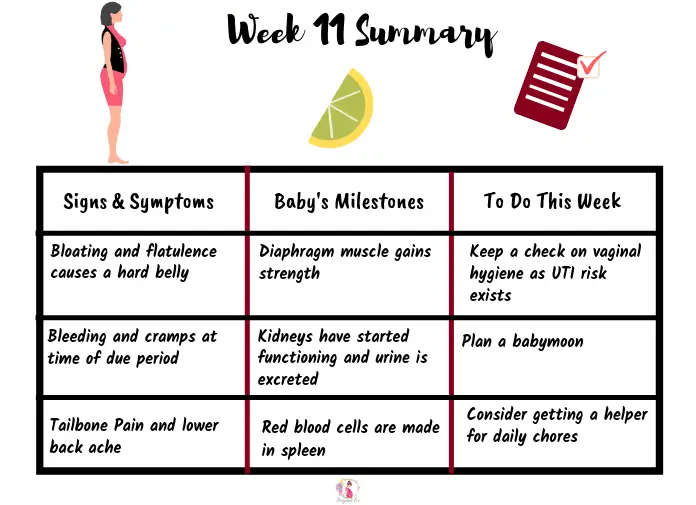
Hail the Goddess with the baby bump. Finally, you see a subtle roundness in the belly. Yes, this is your baby bump. The uterus is rising up and causing the fundus to give a bump look.
Main Symptoms: Constipation and Bloating
First-trimester constipation keeps coming and going. Unless you figure out the home remedy you will be fussy and fed up. Having a glass of prune juice is really effective to treat constipation. You can exude milk from your breasts massaging them.
Hunger pangs can give you unmanageable cravings. Don’t overeat or stuff yourself. Tripping and being clumsy is a weird thing that happens this time. You might be dropping things unintentionally and uncontrollably. Bleeding along abdominal pain is not uncommon. However, if the pain persists and gets severe then consult a doctor.
To Do This Week
- Babymoon is best for this week
- UTI risk being high calls for vaginal examination
- Cut down your standing hours because puffiness and edema can cause severe leg cramps
Baby This Week
Breathing amniotic fluid is working up fetus lung and diaphragm. The nasal passage widens your baby will continue breathing fluid until birth. The ears have reached their normal place. Lanugo hair covers your baby. Limbs have digits and your baby can summersault and take forward rolls.
Milk teeth roots also form inside the baby’s mouth. Gall bladder and kidneys are actively working. Your baby will pee in the amniotic fluid and gulp in fresh fluid. The cycle will continue for weeks to come.
Week 12
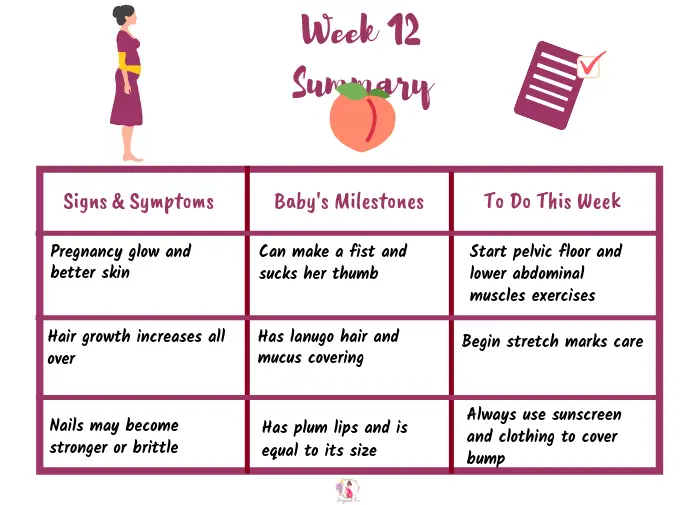
Good signs of pregnancy will start showing. Your hair will improve because the rate of falling will be restricted. That means more pubes and underarm hair too. Shaving, laser, and waxing are safe. Unlike you’re able to shave your lady bits right now you might not be able to in next trimesters. Take it a point in your birth plan whether you want hair shaving or waxing or none before delivery.
Main Symptoms: Shinier Hair And Pimped Energy
Out of nowhere, your energy levels are up and you decide to check out everything from to do list. Bad idea! Your body is still pregnant and cannot bear the physical or mental stress. Divide your work and slowly do it.
The pregnancy glow makes you look like a newlywed bride. Long tresses and changes in nail textures are because of hormones. Human placental lactogen ensures your baby gets all that is needed.
Fluid accumulation in limbs will make them swell. You may have restless leg syndrome or carpal tunnel syndrome due to these changes. Relaxin is acting on all bone tissue joints loosening them.
To Do This Week
- Childbirth classes and surveying the best birth center should be latest done by this week
- A different form of breathing exercises such as Lamaze need to be practiced over time
- Practice Kegels while having sex to gain more control in the pelvic floor region
Baby This Week
As chubby as a plum your baby is growing and having a growth spurt. Lips of the baby get their color. Your baby can make a fist and suckle her thumb. Some babies can take longer and that is perfectly fine. The second prenatal appointment scan might show you how baby squirms upon a gentle belly touch. Brain interneuronal connections are developing and cognitive skills center is differentiating.
Week 13
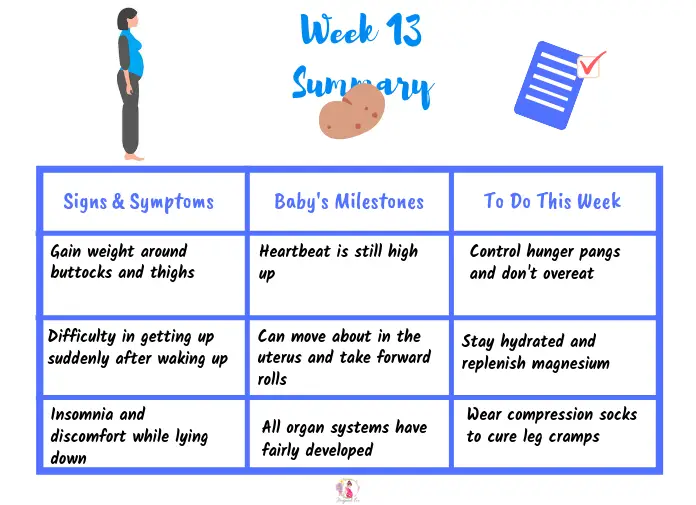
The last week and you have been through 1/3rd of your pregnancy. Week 13 has symptoms of the first and second trimester. Your belly can feel soft when you compare it against bloated one. Twin mother might have to bear morning sickness for longer than others.
Main Symptoms: Blue Veins, Stretch Marks and Showing
Blue and red veins appear to spread and cover your bump, butt, and breasts. With gaining weight the skin stretches and veins become superficial. The red vein running right on the middle partition of your belly will darken. It is the stray of Linea Nigra. Blue veins will stay and will increase or decrease in number. Stretch marks can get severe if your skin is not hydrated. Patches on skin and acne breakout must subside a bit this week. Paleness of the morning sickness too will disappear.
To Do This Week
- Go for swimming, pilates or other stretching exercises
- Tailbone pain can get severe if you don’t move around
- Take walks after meals to help food pass down the gut as uterus compresses it more
Baby This Week
The 13 weeks old fetus is the size of a potato. Totally looking like a mini human your baby moves around. Some women assert that they felt movements of their baby in week 13 which isn’t impossible. All systems and features are there and fairly developed. Next week you can get amniocentesis and CVS tests done to know the risk of genetic disorders.
First Trimester Bleeding
Spotting is a normal occurrence though periods stop in pregnancy. For a mum to see blood in her underpants is frightening. That’s because we often think that blood from the vagina is just menstruation. During pregnancy that is not the case most of the times.
Instead for different reasons, you can expect to have scanty spotting or bleeding. To the extent, you can even see clots in bleeding and continue to have a healthy baby inside you.
Don’t take this as a green flag for ignoring bleeding of any kind while pregnant. Informing your Obstetrician is compulsory for you if you have cramps, pain, and heavy bleeding.
It will be your Gynecologist’s diagnosis which will decide whether your bleeding is a warning sign. You can only judge the superficial symptoms. With ultrasound and other tests, a medical practitioner will be able to find out the underlying causes.
Miscarriage, ectopic or molar pregnancy are few reasons for the first trimester bleeding and cramping. Implantation defects are the biggest cause for very early miscarriage before period. When your body has hCG but pregnancy isn’t sustainable you have a chemical pregnancy.
Bleeding diagnosis will identify these issues at an early stage. These are conditions that need immediate medical treatment for guarding your fertility.
Reasons For First Trimester Bleeding
1) Implantation
The attachment of embryo during 3 weeks pregnant is implantation. Embryo cells have a covering that pierces and softens endometrial lining. Blood vessels at the site puncture and bleed. Quantity of blood is so meager that it reacts with oxygen and turns brown. So, you see brown light spotting before a week from the period. Implantation bleeding is a symptom of pregnancy before a missed period and a good hint.
2) Breakthrough Bleeding
Your body stops degrading the endometrial lining once you conceive. Every month due to failure of conception the lining disintegrated as period flow with clots. Now the lining remains intact but a slight change in progesterone levels can reverse it. Bleeding that occurs in pregnancy at the time of due period and is not menses, is breakthrough bleeding. Some women continue to experience the sign until the end of the first trimester of pregnancy.
3) Old period blood
Some old period blood can remain in the uterus. When the changes take place there and embryo swells it up, the old blood comes out. Dark brown discharge during pregnancy is old period blood. A way of cleaning of uterus you can expect dark brown discharge early in pregnancy just after 1 DPO.
4) Low progesterone
Progesterone prevents bleeding and maintains the lining. Low progesterone naturally will cause spotting. There can be many reasons for low progesterone like a high surge of hCG. Taking in enough omega fatty acid and cholesterol will ensure the synthesis of the hormone. Consult your doctor about taking injectible progesterone while pregnant. Oral progesterone and cremes may not be safe. Nutritional remedies can elevate your progesterone and cure bleeding in early pregnancy weeks.
5) Urinary Tract Infection
You are at a high risk of UTI in the last weeks of the first trimester of pregnancy. Get a vaginal examination if you’ve pain while micturation, itching, soreness or numbness. Bleeding or blood in the urine are signs of spreading UTI. Without delay let your doctor know and get a checkup.
First Trimester Cramping
Cramps in the abdomen are a sign of an impending period before a positive pregnancy test. After knowing that you’re pregnant you take them to be miscarriage cues. There are many other reasons for first-trimester pregnancy cramps. Some of them are natural and unavoidable.
There is no need to take any pain killers. Certainly, you must let a doctor know if they are severe or persistent. Don’t try any form of massage or yoga in the early weeks of the first trimester of pregnancy.
Ideally, you must take up moderate prenatal exercises after the first half of the first trimester of pregnancy. In case you are used to an active routine and post workout cramps occur then give up that exercise totally.
Reasons for First-trimester Cramping
Here are the common causes of cramps in the first trimester of pregnancy:
1) Bloating, Borborygmus and Gas
Colic is a condition in babies where they trap gas taken orally while drinking milk. If you’ve witnessed how a baby wails out in pain, you know the severity of flatulence cramps. Bloating and gas can lead to acute pain in the abdomen. Cramps of abdomen and uterus will feel similar to you as the uterus is shifting.
2) Ovary pain
Ovaries cease their function for a few months. To tune to the change they undergo shifting and changes. Pain in ovary and cysts cause severe cramps in pregnancy. Characteristic of the pain you will have cramps near your ovaries location.
3) Implantation
Implantation bleeding and cramps happen in many women 9-12 DPO. The embryo dissolves the endometrial lining. Tiny blood vessels leak and cramps occur as a result. Pregnancy toxicosis following the step also causes cramps and uneasiness.
4) Accommodation pain
The uterus is growing and shifting up to higher in your abdomen. As it grows and moves up it crushes and pushes the organs. Later in the third trimester, the weight of uterus will crush the urinary bladder under. Accommodation pain and cramps will occur for short intervals at different times. You don’t have to do anything for it.
5) Constipation
Abdominal cramps can also be due to constipation. Taking in fiber-rich food and walking around can relieve constipation and cramps. Laxatives are safe for pregnant women. Just check whether the one you use is a permissible laxative for pregnancy.
6) Vomiting and Dehydration
Dehydration and throwing up, again and again, causes abdominal convulsions and pain. You must replenish all that is lost due to morning sickness. Take water as lemonade, tea or juice but don’t let dehydration take place.
First Trimester of Pregnancy Nutrition
Nutrition during the first trimester of pregnancy has to be focused on every micronutrient. Iron, folic acid and vitamin B12 are essential for brain development.
The daily requirement of each vitamin, carb, and proteins change as pregnancy progresses. You don’t need extra calories but surely extra vitamins and minerals.
All nausea and vomiting make you lose a lot of minerals and water. Replenish yourself with water and fluids that have minerals added.
What should you eat?
Eat food rich in omega fatty acids. Take prenatal vitamins. Always consume freshly prepared food. Avocado is a good vegan fat source for pregnancy. Green veggies are your rescue team from constipation. Also, read this article on pregnancy diet.
What food to avoid during the first trimester of pregnancy?
Avoid caffeine, alcohol, and drugs. Quit smoking. Dairy products are also secondary in terms of benefits for pregnancy. Raw fish is not safe. Greasy and fried food will make you uneasy and worsen your constipation.
Weight Gain During First Trimester of Pregnancy
By the 13th week, you must put be putting on half a pound a week. Body mass index and relative expected gain in weight for a healthy pregnancy has a standard. During your first prenatal visit, your doctor will tell you how you must go about it.
❗Warning for thin mommas ‘You can lose weight during your first trimester of pregnancy‘. Morning sickness and appetite dearth can actually make you lose your existing pounds. Until you are taking a balanced diet everything will fall in place with time.
First Prenatal Visit
The first time you visit your doctor after knowing you are pregnant is at 6-8 weeks. Technically the first visit is the hospital pregnancy test. With coming of labs that provide cheaper tests some ladies might skip it. Nevertheless, the first prenatal visit must happen by 8 weeks pregnant.
In that, all your questions that are pregnancy FAQs for your gynae are answered in detail. Survey your nearby birth centers and zero down the most suitable one.
Things to do while the first prenatal visit
1) Mention your history
Tell the doctor about your past pregnancies, abortion, or stillbirth. Any other surgery or injury that can affect your baby must be reported. Chronic diseases such as diabetes and hypertension must be mentioned too. Other than that consult with your other doctor about any ongoing prescriptions such as antidepressant, psychotic or immunosuppressive drugs. Tell about family history of twins, genetic defects and get a pedigree analysis.
2) Ask your doubts
From safe prenatal workout, hot baths, to sex ask it all. There is no question that you can ever think of which your OB has not heard before. Better than not asking and unnecessarily living in the grey, is to overcome your hesitation and ask. Relying on gynecologists is better than calling your half drunk friend who has absolutely no idea about pregnancy.
3) Take your partner along
It’s cute and it’s essential. There are certain things your partner needs to know too. Single moms, we’re more proud of you! Partner doesn’t necessarily mean male partner, take your pregnancy partner. It could be your mom, or aunt or whoever. Each pregnancy is different and someone with an idea of you will make things easier. You never know when the need can come up.
First Trimester Ultrasound [Dating Scan]
Your doctors will time pregnancy from the last menstrual period. Most women remember the date yet a cross-check along other parameters is the first-trimester scan. During the first scan, your doctor will measure the thickness of your endometrial lining. That indicates how far you’re actually in pregnancy. Dating Scan term comes from calculating the due date.
First pregnancy ultrasound occurs during 7-10 weeks. Two types of scans are available – transabdominal and transvaginal. Early scans are mostly transvaginal. The ultrasound device is inserted through a thin tube inside your vagina. And a screen shows the inside view of your cervix and uterus.
Twins detection, hearing heartbeat, and checking for gestational sac are also done along. A sonographer will point out and guide you to understand the scan picture. You can get a print to journal your first dating scan.
First Trimester Screening
The first-trimester screening is an optional test for assessment of the risk of genetic disorders. There is a blood test and nuchal translucency scan. Both are for screening genetic defects in the baby. Levels of hCG and PAPP A protein are checked in blood. Neural tube defects cannot be screened for with FTS.
Being non-invasive it is a safer option to avoid invasive tests like amnio and CVS. Crown lump ratio is the proportion between the head and lower body of the embryo. Measuring it along with the fluid under the neck and head tells about the possibility of chromosomal diseases. FTS is done in the 11 weeks.
First Trimester Prenatal Tests
A dating scan is just one of the many tests done during the first trimester of pregnancy. There are three types of tests – pregnancy, diagnostic and screening. In the first trimester, prenatal tests are screenings. They only assess the risk of a disease with no confirmation of its actual occurrence.
We will start with the first test you take up after you conceive.
1) Home Pregnancy Test
It looks for hCG in urine. Preliminary and crude test for pregnancy, HPT has a risk of false negatives. Testing when the urine has high levels of hCG is a way to avoid false results. After getting a positive test you go to get a blood test.
2) Urine Test
Before doing a blood test even doctors do a urine test. A Blood test takes time and hCG kits are quick. At the hospital, you have to have to give a urine sample. Another parameter of the test is protein in the urine which indicates Proteinuria.
3) Blood Test At Hospital
A beta hCG test measures the same hormone as hCG kit. Even a kit can work with blood. But a hospital test is more accurate. Your blood sample is taken from a superficial vein. The test reports will take a day to come. Along with confirming pregnancy, a blood test also reveals Rh compatibility. The Rh factor is a sugar like a moiety on red blood cells. Your fetus and your blood group with regard to Rh factor must be compatible or an immunosuppressive prescription is mandatory.
4) Pelvic Examination
A pelvic examination is used for measuring the size of the uterus. The position of uterus and orientation matter immensely during pregnancy. Holding a vaginal cone using your pelvic muscles will help you identify your muscles for labor. Other than that a pelvic examination is also done during a PAP smear test.
5) Genetic Screening
First Trimester Screening, Nuchal translucency, NIPT, and cell-free DNA tests are common genetic screening. They only give results in ratio showing a chance of occurrence of the disorder. First-trimester genetic tests are non-invasive.
6) Thyroid Tests
The Thyroid gland is a major metabolism controller. Women who have Thyroid abnormalities such as hypothyroidism or hyperthyroidism have a risk of a baby with Downs Syndrome. Thyroid disorder drugs also have the same side effects. Reporting symptoms like excessive sweating, sudden weight gain or loss calls for the test.
7) Screening Infectious Diseases
Cytomegalovirus Infection is a disease that can occur during pregnancy and pass on to the baby. And this is just one of the many like rubella, herpes, HIV, etc. While for HIV all mothers are screened but CMV infection screening is optional. You can get a list of screening tests available at your chosen hospital and decide the ones you’d want.
8) Body Mass Index
Pregnancy weight gain is not random. Mother in different body weight ranges has to maintain a specific rate of gaining pounds. General anthropometric tests are done for creating a medical record of your case.
9) Pregnancy Risks Assessment
Different risks to pregnancy can come at later stages. Certain tests are indirect measures of these pregnancy risks. For instance, pelvic examination and scan can estimate the risk of placenta previa.
First Trimester Dos and Don’ts
You have already heard a lot these, some true some not. Here are Must-Dos and Don’ts for the first trimester of pregnancy:
To-Dos
- Budget for baby
- Survey birth center and create a birth plan
- Search baby names, pregnancy announcement ideas, gender reveal
- Start a baby registry
- Take rest and divide your work to others co-living
- Negotiate prenatal genetic tests with your OB and partner
- Read pregnancy advice, labor techniques and parenting tips
- Have sex when you’re allowed to
- Eat healthily and take prenatal vitamins
- Adjust your maternity leave duration after getting a due date
Don’ts
- Stop physical labor
- Don’t eat raw, tinned, stale, uncovered food
- Quit smoking, caffeine, and alcohol
- Stay away from pets litter
- Don’t get up suddenly after waking up
- Avoid high mercury fish like sharks



